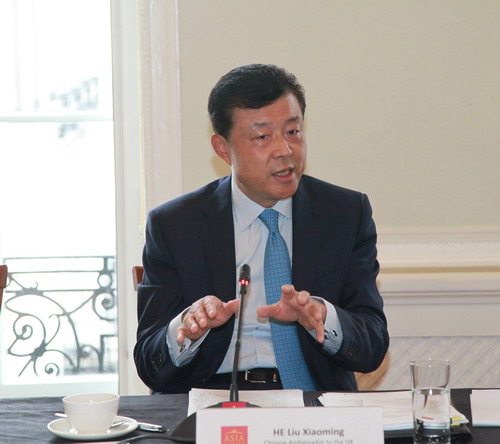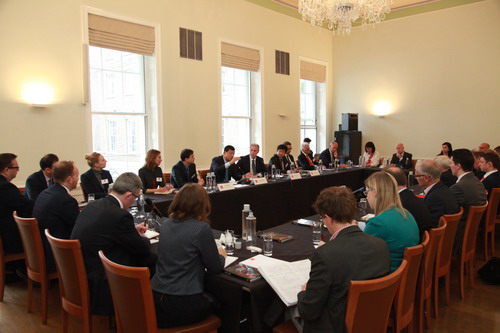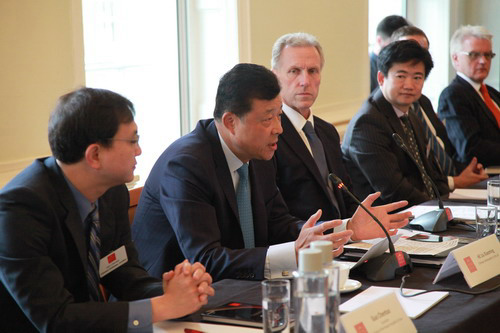|

Mr. Lawrence,
Distinguished Guests,
Ladies and Gentlemen:
It is a pleasure to be back at this Asia House breakfast.
When I gave a speech here last year, I talked about the "Golden Era" of China-UK relations and I had an in-depth exchange of views with members of the Asian House on China-UK cooperation across the board.
Today, I am going to talk about China's economic prospects. There have been much interest and various interpretations in the media recently about China's economy. I think the public here deserve to get China's perspective on China's economy. So, as Chinese Ambassador, I would like to share with you some of my observations.
Let's begin with a look at the bigger picture.
The bigger picture shows that the fundamentals of the Chinese economy have maintained a sound momentum. I would use "steady progress" to describe the overall economic performance.
In the first quarter China's GDP grew by 6.7%, which is higher than market expectation. Moreover, if you think about it in terms of 6.7% of the second largest economy, namely over ten trillion US dollars, that is a rather big annual increment.
There are many other positive signs:
l The economic structure is improving;
l The industrial upgrading is picking up pace;
l There are multiple growth drivers;
l And China's economy on the whole has stronger vitality, better quality and greater efficiency than before.
However, we do not hide from the difficult problems.
l We have to admit that some of the deep-seated structural problems in China's economy still remain.
l Some industries are having a tough time during their transition and upgrading.
l Sluggish demand and overcapacity coexist, and such a situation is not expected to be addressed shortly.
That is why the high-speed growth seen in the last three decades is not expected to sustain. And that is also why the projected economic curve would be L-shaped rather than U-shaped or V-shaped.
In spite of these challenges, I believe that the Chinese economy is still full of potential and resilience.
l China has a big market and there is still room for further growth.
l Continuous and deeper reforms will activate new growth drivers.
Therefore, I would say that although both opportunities and challenges exist, there are more opportunities than challenges. In a word, the prospects for China's economy remain promising.
These are what China will do to overcome the problems and challenges on its way ahead.
First, China will take comprehensive and deeper reform measures to fire up new growth engines.
l Measure number one: supply side reform. The supply side reform aims to address the mismatch between supply and demand and will optimise the allocation of key resources. This will address the imbalance in supply-demand relations.
l Measure number two: streamline administrative approval and delegate central power to lower authorities. This will further libralise the market and will create a level-playing ground for business.
l Measure number three: innovation-driven development. China has rolled out strategies to encourage innovation and entrepreneurship. This will unleash the vitality and creativity of the market players.
Second, China will manage overcapacity appropriately.
In April, I wrote an article for The Daily Telegraph, in which I called for China-UK joint response to steel overcapacity.
Compared with the UK, China faces tougher challenges when it comes to reducing domestic coal and steel capacity. But we have made a specific timeline to cut overcapacity and have adopted a number of measures in relation to tax revenue, finance and social security. These measures have shown initial effect.
l In the past three years, China slashed 90 million tons of steel capacity. In the next five years, China will cut a further 100-150 million tons of crude steel capacity.
l From January to April, China's crude steel production fell by 2.3% and coal production downed by 6.8%.
Third, China takes debt risks seriously and will always stay on guard.
l The current government debt risks are generally within control. Both the fiscal deficit and government debt are secure.
l The ratio of non-performing loans has been kept below two percent, which is lower than the global average of three percent.
l As for the enterprise debt, this will be dealt with by encouraging enterprises to turn debt into equity through a market-based approach. This will effectively lower the leverage ratio.
Fourth, China will upgrade its open-up structure.
The trial scheme of Free Trade Zones marks a new round of reform and opening-up in China. Going forward, the Chinese government will provide better services to foreign companies, institutions and individuals in their business exchanges and cooperation in China.

Ladies and Gentlemen,
China's reform and progress will continue to bring development opportunities to the world, not least to Asia. The greatest opportunities are to be found in the building of the "Belt and Road".
The "Belt and Road" initiative is China's major move to deliver its overall opening-up strategy. So far there have been a number of early harvests.
l The "Belt and Road" initiative is gaining rising international recognition. More than 70 countries and organizations have expressed their readiness to support and participate in this initiative, and 34 countries and international organizations have signed with China inter-governmental cooperation agreement on jointly building the Belt and Road.
l The projects under the Silk Road Fund, the interconnectivity building efforts and the international capacity cooperation have led to a series of practical results.
l Trade and investment along the "Belt and Road" have been greatly facilitated. For example, the China Railway Express has, to date, made over 1,500 journeys between China and Europe. Its role in stimulating economic development and trade growth in countries along the Belt and Road routes is increasingly recognized.
l In addition, cultural and people-to-people exchanges between China and countries along the routes are getting ever closer.
China has made the commitment that on every project of the "Belt and Road" initiative, decisions will be made by all stake-holders, actions taken jointly and the benefits shared by all. China will stay true to that commitment.
The ultimate goal of the "Belt and Road" initiative is to serve the wellbeing of the people of all the countries along the routes. China will strive to dovetail its development strategy with those of the relevant countries in order to achieve that goal.
Secretary Hammond visited China in January. During that trip, China and the UK agreed to match China's "Belt and Road" with Britain's National Infrastructure Plan. This will surely open up more space for businesses from China and the UK to engage in mutually-beneficial cooperation in infrastructure.
Just yesterday, I spoke at the Seventh Sino-European Entrepreneurs Summit. The theme of the Summit is "China's One Belt One Road Strategy: New Growth and New Opportunities." I believe if China, Britain and Europe could join hands in advancing the "Belt and Road" Initiative, this would create much benefit for both sides:
l The Belt and Road could become a new source of growth for China-Europe cooperation.
l In turn, with both China and Europe taking part, the "Belt and Road" would gain powerful "twin engines".
l And this will help power up the "Belt and Road" projects.
Ladies and Gentlemen,
Development opportunities could go to waste without a peaceful, stable and secure environment.
Recently, the issue of South China Sea has attracted much attention. Some people start to worry about the regional tension or its possible escalation into conflicts. I have expounded on China's position on several occasions. Here again, I would like to make a few more points.
First, China honors its commitment on the South China Sea issue and upholds the international rule of law. China's position has been consistent, that is, the disputes should be settled peacefully through friendly consultations and negotiations.
The Philippines-initiated arbitration is a provocative political farce that pays no regard to facts. Since the very beginning China has made it clear that China will not accept or participate in the arbitration. By doing so China has nailed down the commitment it has made jointly with the ASEAN countries. By doing so, China is also exercising the right of a sovereign state to choose the means of dispute resolution independently. China's position is completely in line with the international law.
My second point is that China cares about peace and stability in the South China Sea more than anyone else. The South China Sea is on an important shipping route – a maritime lifeline for all Asia-Pacific countries. It is China's main passage of trade.
Now, there is a false argument for "freedom of navigation" in the South China Sea. There are also speculations about "militarisation". There is even abuse of international rule of law to put pressure on China with the so-called arbitration. But none of these will ever shake China's resolve to safeguard the peace and stability in the South China Sea. Nor will these stop China from pursuing peaceful development.
So, what is the key to safeguarding peace and stability in the South China Sea? Here is my third point.
I believe that all the relevant parties should respect each other and work with each other. Modern international relations value sovereign equality. Big countries should not bully small nations, and vice versa. Only mutual respect and win-win cooperation can pave the way for peaceful negotiation and consultations.
Therefore, we hope that the Philippine government will work with China towards the same goal and return to the track of bilateral negotiation. For countries following the issue from outside the region, it is better to contribute to peace and stability in the South China Sea rather than making troubles or provocations.
Ladies and Gentlemen,
The British people love to say:
"Where there is a will, there is a way."
The Chinese people have a similar saying:
"Nothing is impossible for a willing mind."
A quick look at the past 30 years will drive home how China has been committed to reform and opening up, and how China has made its way through all kinds of challenges and difficulties to become what it is today.
Therefore, I have every confidence in China's economic prospects. China will accomplish its transition and upgrade its economy. A bright future of prosperity and stability awaits not only China but also Asia and rest of the world.
Now I am happy to take your questions.


|

